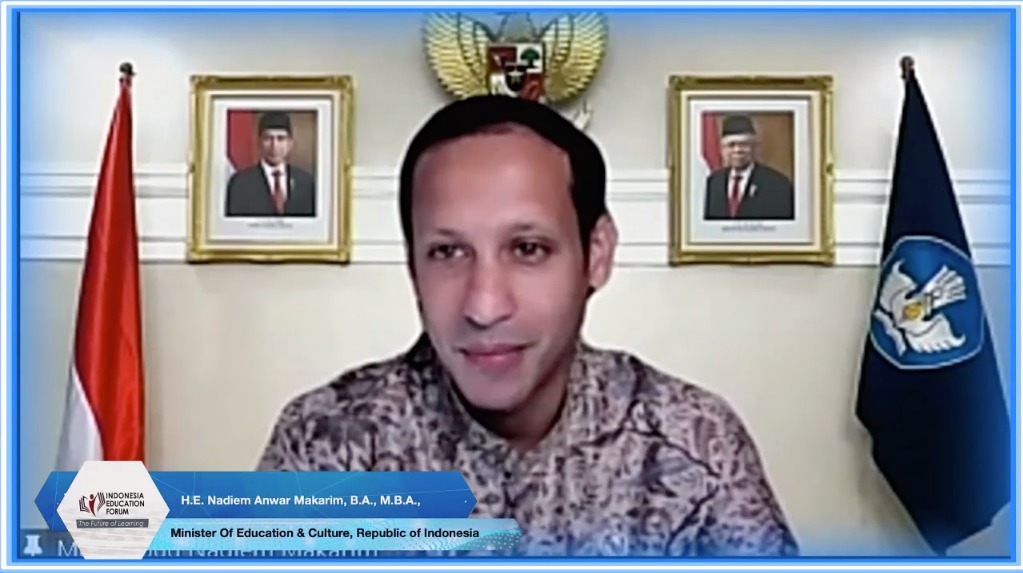JAKARTA -In The Fireside Chat Session with Ilham Habibie, Co-Founder of Orbit Future Academy on 2nd Annual Indonesia Education Forum 2021, Minister Nadiem Makarim delivered a passionate call for change in thinking and practice to transform the world’s 4th largest education system. Technology, he noted, can be an enabler but more importantly, mindsets must change.
According to him, Indonesia must not be just a mere consumer of technology but must strive to be a technology producer. Technology must also be applied within the Ministry of Education & Culture so as to better develop and execute programs based on data and analytics. And in terms of improving learning outcomes for students, he urged the participants, many of them educators and teachers, to move away from standardized curriculum and tests as each child has a different learning journey.
“I have strongly opposed the one-size- fits-all principle, for example in student assessment. Standardized assessment models or systems are one of the biggest issues in education. With the original aim to make it easier to assess students, compare students, we standardize curriculums, exams and many other things. This is the risk in transforming education. In my mind, technology plays a pivotal role and proves that we can measure things without standardizing them. I think this is very powerful in transforming what is happening in the classroom all the time,” said Mr. Makarim.
Secondly, given the gap between industry needs and the capacity of fresh graduates, the minister said the education system must produce more micro-entrepreneurs who can earn a living even if they do not find jobs. He also warned against the misconception that the tech sector can absorb all -new fresh graduates as it is a small part of the larger economy. And not all graduates must be coders or computer engineers but they must possess an engineering mindset.
He also said that schools and universities must stimulate a real – life working environment so students get a feel of what it is like to work in an office or at a plant. Universities can also work with the private sector to have students intern with them to give them the necessary experience before they graduate.
The minister also answered several quest ions from a panel of experts, including those from the private sector . Answering a question from Shweta Khurana, Director of APJ – Global Partnership and Initiatives Group, Intel Corporation regarding the government’s efforts to switch from a technology consumer to a technology producer, Mr. Makarim stated that being a technology producer would not absorb a large workforce, say 20% of the total population of Indonesia in an instant, but could increase the productivity of the Indonesian economy as a whole.
“The market demand for professions such as programmers, software engineers, light material designers, UX engineers, UI engineers is indeed high. We want to be a technology producer in two ways. First , bringing practitioners to teach on campus. Second, placing students to study in technology company offices. Currently, the government is still subsidizing this program. This is the fastest way that can be done. I f we did it in the usual way, it might take probably 20 years to transform every department or faculty of computers throughout Indonesia. I f we can employ out of 10% for the best, that’s good,” he noted.
Answering quest ions from Dr. Rani Burchmore, Asia Pacific Education Industry Lead (K-12 Strategy, Sales and Programs), Microsoft, regarding the government’s plan to implement a game-based curriculum, Minister Makarim explained that the ministry wants to implement it in the near future. A-game, project, builder or maker -based approach is intended so that students have engineer-based thinking.
“Everyone needs to have an engineering mindset, whether he is a singer, actress, philosopher or musician. You need to have an engineering mindset to address problems in your life, or organize your career and to overcome new problems that will continue to appear in your life,” said Mr. Makarim.
Answering a quest ion from Jaspal Sidhu, Founder and Chairman of SIS & Inspirasi Group of Schools regarding the government’s plan to develop a model for public-private cooperation (PPP), the minister noted that the Sekolah Penggerak is one project developed by the ministry with the intention of creating a partnership with the private sector whereby organizations can run a full semester program in government schools.
“We do not explicitly apply the type of cooperation, for example, like the Charter School in the US because of the complex regulations. We have our own version of the Charter School , in which we are establishing 2,000 activation schools this year and will increase to 5,000 activation schools in the following years. We are carrying out a holistic transformation, where many tutors from the private sector join the program. We do not own or run the school , but with the Sekolah Penggerak model this is a big progress because we are more actively involved,” said Mr. Makarim

